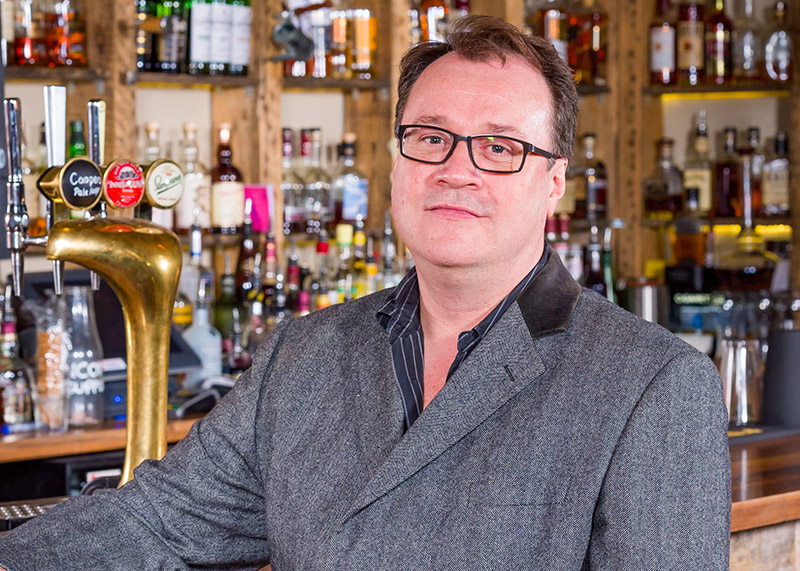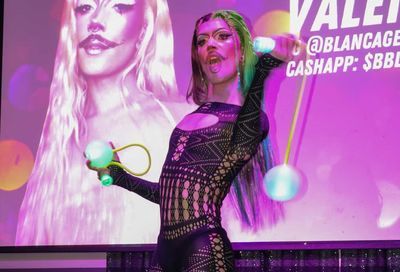Matthew Scott Montgomery was “Punished” with Conversion Therapy
The former Disney star shared details of the therapy he underwent to "cure" his same-sex attraction on a recent podcast.

A former Disney actor has revealed that he privately attended conversion therapy while pursuing his acting career.
Matthew Scott Montgomery, best known for the Disney show So Random! — as well as guest spots on Shake It Up, Jessie, and Austin & Ally — told the story of his experience during an interview with Christy Carlson Romano on her podcast Vulnerable.
“Conversion therapy is the idea that there’s a certain therapy that can change you from being gay to straight,” Montgomery explained for Romano’s listeners who may not be familiar with the practice. “So the hope for conversion therapy is to convert you from your natural-born self to something you’re actually not.”
Montgomery noted that he had shared a TikTok video a few years ago telling his fans that he used to go to conversion therapy sessions on his “days off” while filming shows for the Disney channel — although he said the network played no role in his decision to pursue therapy.
“Disney was always really great to me,” he said. “It was not their idea. They didn’t know. No one knew. My cast mates didn’t know at the time. It was a secret.”
Montgomery, an adult at the time, cites his family’s conservative beliefs as the impetus for attending conversion therapy. Growing up in North Carolina, in an “environment that was all sports, grades, terror, guilt,” he had no outlets to express his true self or his identity.
“It was kind of like me growing up, in the morning, queer kid growing up in the South, I would wake up, ‘Oh no, I’m still alive, what do I do?’ to try and get through the day,” Montgomery recalled.
He was violently bullied as a child and would rely on code-switching — watching how straight people act to mimic their behavior — to ensure he wouldn’t be ostracized or harassed for acting too effeminate.
Montgomery’s life changed when he attended New York University. There, three separate teachers suggested that he leave school and move to Los Angeles to pursue acting.
After landing a role in the Del Shores play Yellow, starring as a character abused and disowned by his parents for being gay, Montgomery decided to come out to his parents in real life, reports The Messenger.
Montgomery’s parents did not take the news well, and enrolled him in conversion therapy. Even though he was over 18, he said his background and the beliefs he had been raised with led him to embrace the idea that he was “born into sin” and deserving of being “punished.” So he complied with his parents’ demands.
Montgomery later landed acting roles on Disney shows, but would continue to attend conversion therapy in private, adopting the mindset that “I should be punished on my days off.”
Montgomery attended therapy at a practice headed by the late Joseph Nicolosi, the founder and president of the National Association for Research and Therapy of Homosexuality, with Joseph Nicolosi, Jr., the founder’s son, serving as his therapist.
“This place was Christian, and prided itself on being a Hollywood place,” Montgomery said. “And their selling point was ‘[if] you look at any billboard in L.A. and see any male actor, they’ve been through these halls before.’ This place was specifically was for gay men who wanted to be turned from gay to straight, and make it as a straight movie star in L.A.”
Montgomery said his conversion therapy sessions initially started out as “talk therapy” — which proponents of conversion therapy claim is harmless and unfairly restricted when they argue against bans prohibiting the practice. However, those sessions eventually evolved into homework-style sessions where he had to fill out equations in a textbook.
“What they taught there at this place was there’s no such thing as a gay man. There are straight boys who are born with sensitive, artistic temperaments, who have emotionally overbearing mothers and emotionally unavailable fathers,” Montgomery said of the ideology behind the conversion therapy practice he attended.
“And when I experience shame or insecurity, I seek out SSA, which is same-sex attraction, and I want the love of a straight man, which I’m never going to get. … So I had to fill out worksheets every night about when I’m feeling SSA, trying to trace it back to, ‘Was I feeling something that day, where I was feeling insecure or was I feeling shame, is that why I’m seeking out a straight man’s affection?”
Montgomery also said he was forced to play football as homework, and had to apologize to his parents for “being a sensitive little boy.”
He even claimed to have engaged in therapy, in which he held metal rods as therapists gradually, over multiple sessions, tried to build up his resistance to electric shocks while engaging in hypnosis-style visualization exercises.
Those exercises, which served as a form of aversion therapy, involved applying shocks whenever the visualization exercises called for Montgomery to imagine hugging another man, for example, to make him associate the negativity of the shock with his feelings of same-sex attraction.
Montgomery believes his role in Yellow served as a “healing” experience, in which his character was embraced and adopted by his neighbors, realizing that he no longer needed to pursue conversion therapy. He also began making friends more accepting of him and his sexual orientation, including fellow Disney stars Demi Lovato and Hayley Kiyoko.
“At that point, I was able to begin to carefully curate a life that was filled with love and art and expression that was satisfying me and making me so happy, in a way that I’d never been before,” Montgomery told Romano.
“And I was like, ‘Oh, wait, I don’t deserve to be punished. Life is supposed to be fun. It’s just be filled with love and joy. And I’m so proud of the work I’m doing and the person I’ve become. And there are these people around me who really love me and celebrate me. I don’t have to do this anymore.'”
Support Metro Weekly’s Journalism
These are challenging times for news organizations. And yet it’s crucial we stay active and provide vital resources and information to both our local readers and the world. So won’t you please take a moment and consider supporting Metro Weekly with a membership? For as little as $5 a month, you can help ensure Metro Weekly magazine and MetroWeekly.com remain free, viable resources as we provide the best, most diverse, culturally-resonant LGBTQ coverage in both the D.C. region and around the world. Memberships come with exclusive perks and discounts, your own personal digital delivery of each week’s magazine (and an archive), access to our Member's Lounge when it launches this fall, and exclusive members-only items like Metro Weekly Membership Mugs and Tote Bags! Check out all our membership levels here and please join us today!



























You must be logged in to post a comment.